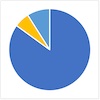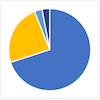In the Spotlight:
The Why, What and How of Diversifying Income
Karen Thickstun, NCTM
MTNA Business Digest, Volume 3, Issue 1
October 2023
How many times have you been advised “don’t put all your eggs in one basket” or told that “variety is the spice of life?” My tuition fees are part of my overall income “pie,” but other slices include a church position, adjunct collegiate teaching, accompanying and speaking engagements. How many ways can you divide the pie? And why should you?
Diversified revenue (or income) streams are often referred to as a portfolio career because income is being generated by more than one source or employer. A traditional career tends to follow one path to a well-defined destination. A portfolio career may follow multiple paths at the same time toward multiple destinations. Portfolio careers are becoming more and more prevalent as employers reduce their reliance on long-term, full-time positions.
Diversified revenue streams mitigate financial risk in the long run. If one stream performs poorly, other streams may perform well, thus allowing for a more stable income overall. For example, my church income has remained relatively stable while my adjunct teaching income varies each semester. But teachers are also intentionally designing portfolio careers because they enjoy the variety and other factors.
How are teachers successfully diversifying in our profession? There is no one right answer to this question. And that’s one of the benefits of diversified income—each teacher can design a portfolio career that fits their own unique interests and skills.
To help answer this question, I collected survey responses from 20 teachers. I intentionally surveyed only teachers that I already knew have at least 3 diversified revenue streams, including a successful studio. The majority (14) of the respondents run independent studios. All respondents teach primarily piano.
Survey Results
The following chart shows that teaching revenue accounts for 60% (median) of their total income. The remaining income comes from a wide variety of sources, to varying degrees.
|
Type of Revenue Stream
|
% of Total Income (Range) |
Median
|
| Teach (includes private, group, online) |
10%–90% |
60%
|
| Perform (includes solo, chamber) |
5%–35% |
22%
|
| Church position |
10%–20% |
15%
|
| Collaborative (includes accompanying soloists, choirs) |
5% - 8% |
NA
|
| Online courses |
4%–75% |
36%
|
| Digital content |
5%–6% |
NA
|
| Consulting, coaching |
2%–8% |
5%
|
| Adjudication |
5%–9% |
NA
|
| Product sales (includes compositions, teaching aids, music-related products) |
1%–20% |
2%
|
| Speaking, workshops |
1%–4% |
2%
|
| Affiliate income; digital sponsorships |
2%–7% |
5%
|
| Arts administration position |
5%–60% |
45%
|
| Non-arts administration position |
15% |
NA
|
There is no one way to build a career with diversified revenue streams. None of the survey respondents’ career portfolios were identical. Their diversified revenue streams illustrate the degree to which one can individualize a portfolio career, as evidenced by these pie charts. No two are alike, and they are quite diverse.
Chart Key


A |

B |

C |

D
|

E |

F |

G |

H |

I |

J |

K |

L |

M |

M |

O |
The “Why” of Diversifying Income
“Why diversify? I love just teaching.” Excellent question, and many teachers are quite comfortable with one revenue stream. That’s just fine if that works for you. In the business world, diversification (of products or services) mitigates the financial risk of one product not performing well. That’s true for our careers also, but interestingly, the surveyed teachers did not put financial risk as a top factor in their decisions to diversify. Many simply love the variety. Other responses/benefits cited were fun, engagement, personal enjoyment, avoiding burnout, new perspectives, flexibility, impact, personal growth, networking, balance, service to community and/or profession.
Why Diversify?
Being able to perform, teach and do advocacy work all at once is interesting, engaging and fulfilling! There are financial considerations, but more importantly for me, having multiple revenue streams alleviates a lot of pressure from a mental health perspective: It minimizes the effects of any setbacks in any one area. (A stark contrast to many years in conservatory-style training, where it felt that everything rode on performance ability.) —Timothy
My work in teaching, performing, research and mentorship allows me to understand the industry in a more comprehensive way. —Joanne
It’s fun! I am most satisfied in my career when I have 2–3 things going on at once. The variety gives me a fresh perspective and makes me more creative and resourceful in each individual area. —Andrea
By spreading resources to other teachers, I feel as if I get to be part of a change. The world of music teaching is getting more diverse, more creative and more evidence-based. I want to be part of that movement. —Nicola
I enjoy doing those activities and honing those skills. It also brings me joy to contribute to the music community by doing those things. Judging allows me to travel, meet new people and hear pieces I might not be familiar with. It also helps me assess my own students in my lessons. Presenting, giving workshops and consulting to help other teachers allows me to network as well. —Clinton
I like to maintain multiple revenue streams for personal, creative and educational growth. —Jennifer F.
At the end of the day, I contribute what I do because I have a sincere desire to Elevate the Profession. —Christina
By using several income streams I simply create a financial balance in my life which allows me to have choices (i.e. to set boundaries with students without fearing a loss of income). —Antonella
The “What” of Diversifying Income
David Cutler, author of The Savvy Musician and The Savvy Music Teacher, is a strong advocate of diversification to increase income. Both books share hundreds of real-life case studies of successful musicians/entrepreneurs. In addition to private lesson tuition, he notes seven income streams for private studio teachers to consider:
- Group classes. Offer group activities weekly, monthly or once a semester, for an additional fee.
- Camps. Offer half-day or day-long camps during summer, holidays or school breaks.
- Concert trip. Teacher buys a block of tickets for a local concert at discounted group rate and creates a special outing for students; participation fee covers cost of ticket plus margin. This approach could be used for any special event that the teacher might organize.
- House concert. Teacher books a guest artist to perform at home of a parent; admission charge covers cost of artist plus margin.
- Media creation. Create and sell high quality DVD of recitals. Create supplemental online content.
- Merchandise. Teacher offers retail sales of music, gifts and supplies in the studio. (Note: check local and state laws regarding sales tax collection and business license requirements.)
- Income possibilities outside of studio teaching. See box for some of Cutler’s 200+ ideas.
INCOME OPPORTUNITIES
FOR MUSICIANS
Performance:
Weddings
Ensembles
Restaurants
Church services
Educational residencies
Holiday parties
Recording studios
Accompanying:
School and church choirs
Instrumental competitions
Freelance vocalists/instrumentalists
Composing/Arranging:
Teaching pieces
Online greeting cards
Sacred music
Jingles
Local ensembles
Teaching:
Adjunct faculty
Substitute teacher
Preschool/child care
Camp
Teaching artist
Instructional video
Webinar
Online courses
Writing:
Program notes
Concert reviews
Journal articles
Books or e-books
And more:
Clinician
Conductor
Instrument repair/technician
Critic
Music librarian
Music therapist
Music software designer
Radio announcer
Sound engineer
Transcriber
Source: Cutler, The Savvy Musician
Aleah Fitzwater is a licensed music educator, private flute teacher and photographer. In an article for Yamaha, she shares additional ways to supplement teaching income:
-
Etsy. Aleah started her Etsy shop in 2018 to sell custom-made music jewelry and later other items, including refurbished instruments.
-
A second instrument. Aleah encourages teachers to expand their skill set by learning another instrument. Then, after sufficient progress, offer beginner lessons. Teaching a different instrument can provide a mental break from the primary lessons.
-
Many music teachers have “teaching-adjacent” skills such as music arranging, editing, engraving or production. Transferable skills like writing can be utilized for writing reviews, blogs, and e-books. Create your own small business or work for a freelancing site such as Upwork or Fiverr.
The “How” of Diversifying
Knowing what you want to do, and why, is only part of the challenge. Knowing how to do it is equally important. Entrepreneurial You by Dorie Clark addresses the “how”—how to create sustainable income streams in today’s uncertain economy and digital environment. Clark outlines specific revenue streams and uses real-life case studies to illustrate successful strategies. While not written for musicians or teachers specifically, almost all strategies are applicable to our profession. Specific chapters focus on how to:
- Become a coach or consultant
-
Build a speaking practice
-
Build a following through podcasting
-
Develop your audience by blogging and vlogging
-
Bring your followers together (through conferences or other events)
-
Create an online course
-
Create digital products and online communities
-
Leverage your reach with affiliate income
Clark advises entrepreneurs to "find the activities that interest and delight you…double-down and work on mastering (them) before adding on another activity. ‘Deep work’ is what will get you recognized, attract an audience, and allow you to monetize your ideas.”
“What matters most is focus and execution…You have to forcibly make room in your schedule to write that blog post, record that podcast, attend that conference, or create that curriculum. But when you make it a priority and a habit, amazing things start to happen.”
Read more about Clark’s Entrepreneurial You.
“The possibilities are numerous once we decide to act and not react.” —George Bernard Shaw
What often holds us back is our own fixed mindset, our discomfort with the uncertainty of starting something new or our lack of self-confidence. More subtle might be a self-imposed stigma of “If I’m not teaching or performing, then I’m not being true to my passion.” Recognize that these mindsets are within our control to change, ignore or reverse. Organization and time management skills can be learned. We can follow more than one passion at a time.
So now you may be thinking, “Great idea! I’d love to diversify my income, but where do I start? I have lots of ideas and interests.”
One way to start building your portfolio career is through the 3-Step Framework that Ashley Danyew describes on her website, www.musicianandcompany.com.
-
Step 1 is to identify and DOCUMENT your skills, your interests, your strengths and your experiences.
- Step 2 is to CRAFT a narrative of who you are as a professional. What makes you different? Where might your skills/interests/strengths/experiences intersect to create a unique offering?
- Step 3 is to EDIT or “clarify, curate and refine your portfolio career into something sustainable, profitable, and flexible… .”
For more information on this framework, contact ashley@ashleydanyew.com.
In a recent newsletter (April 7, 2023), Leila Viss shared her story of diversification, noting that one must diversify their skill set to diversify income streams. This can lead to a natural evolution of new projects and income streams. She shared how her long-time church position presented challenges (aka opportunities!) to arrange hymns to match a particular service’s mood or need. She developed skills in composing/arranging, which has led to her “Composium” online course for teachers. Additionally, she added group teaching, online lessons and an online store as she developed skills in those areas.
Survey respondents had plenty of advice to share for teachers who want to diversify their income:
| Ask yourself, “What is the purpose and/or value of pursuing this extra opportunity?” In 3–5 years, what do you anticipate to achieve in the variety of work you do? …be prepared and be open to change—it is always a process of learning and adapting. —Joanne |
It requires a lot of organization and time management skills, but it is well worth it! Having multiple revenue streams also demands that the individual be self-aware of their limitations…Be kind to yourself when you are first starting—it will take a while to adjust and find the right balance and that is okay. —Timothy |
| Find things you enjoy doing—don’t just say “yes” to things for the money or you'll regret it. Also, play to your strengths—what are you particularly good at, and how can you serve others with this skill? —Jennifer W. |
The idea that one can only have one job is old-fashioned. It is about broadening your perspective about what you can do and who you are. By expanding yourself, you become better at whatever you are doing as a primary job…Try not to confine yourself to a job title, but always be flexible and curious about what your inner voice is telling you. It all starts with the courage to believe in yourself that you are limitless in the first place. —Jeeyoon |
| Don’t expect it to happen overnight. Everyone wants to do it, and while technology has made it easier for more people to create and share—it’s not easy. You can’t just create something and expect to start selling it. You have to take time to build a name/brand, and it takes time to market products and services. —Amy |
If you’ve been considering online income streams because it's an easy get-rich-quick scheme, walk on by. There is no such thing as passive income! When people talk about revenue coming in while they sleep, that’s because they’ve worked their behind off laying foundations so that could happen. They didn’t do the work at the time they made the money—but they definitely worked for it. —Nicola |
| Start small, start with one thing, but start! It doesn’t even have to be some huge innovative idea that will bring you millions of dollars, although it might! Don’t worry about that, just start working on something that you’re passionate about. That positive energy and momentum will grow and motivate you to continue and expand. —Clinton |
Be honest with yourself about your goal and understand your intended audience… Also – understand this work is not for everyone. It’s easy to look around at colleagues who are producing materials and begin to feel as though you “should” be creating something as well. If teaching is the true desire of your heart, focus on teaching. Build policies and tuition structures that are going to allow you to feel secure and content doing the work that lights you up, rather than looking for supplemental income streams that are just going to leave you scattered. —Christina |
| My biggest advice for teachers who want to diversify and manage multiple revenue streams is to prioritize time management and balance. It's important to ensure a healthy work-life balance so you don’t burn out quickly. Start small and build. Research options carefully and go into it with a mindset of flexibility versus dependence.
Network when there is opportunity.
Seek out opportunities
that excite you
and align
with your interest
and
expertise. —Jennifer F. |
Listen to what people want, then do that. —Christopher
|
Ready to get started? Begin it.
“Whatever you can do or dream you can, begin it; Boldness has genius, power, and magic in it.” – Johann Wolfgang von Goethe.
My sincere appreciation to the following teachers who shared stories, survey responses, resources, suggestions and/or advice for this article.
- Joanne Chang, www.joannechangpiano.com
- Amy Chaplin, www.PianoPantry.com
- Ashley Danyew, www.musicianandcompany.com
- Antonella Di Giulio, www.antonelladigiulio.com, www.musicaiq.com
- Jennifer Foxx, www.musiceducatorresources.com, www.FoxxPianoStudio.com
- Jeeyoon Kim, www.jeeyoonkim.com
- Andrea Miller, www.musicstudiostartup.com
- Christopher Oill, www.oillmusic.com
- Clinton Pratt, teachers.pianosensei.com
- Heather Smith, www.heathersmithpiano.com
- Jennifer Stadler, www.jenniferstadler.com
- Timothy Stephenson, www.timstephensonpiano.com
- Leila Viss, www.leilaviss.com
- Jennifer Walschap, www.imaginemusicandarts.com
- Christina Whitlock, www.christinawhitlock.com
- Josh Wright, www.joshwrightpiano.com

Karen Thickstun, NCTM, teaches piano pedagogy at Butler University and recently retired as founding director of the Butler Community Arts School. She holds degrees in music, economics and business. Thickstun is MTNA immediate past president.